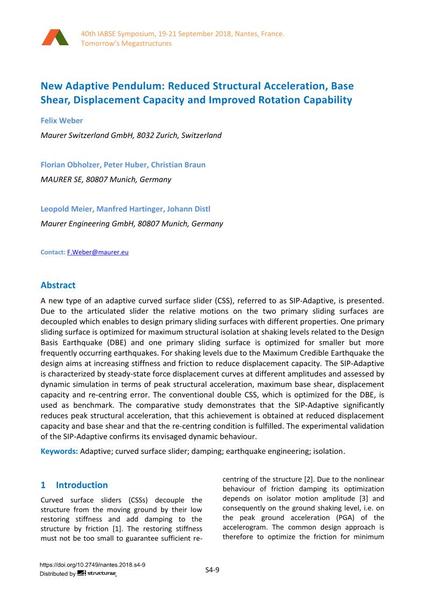New Adaptive Pendulum: Reduced Structural Acceleration, Base Shear, Displacement Capacity and Improved Rotation Capability

|
|
|||||||||||
Bibliografische Angaben
| Autor(en): |
Felix Weber
(Maurer Switzerland GmbH, 8032 Zurich, Switzerland)
Florian Obholzer (MAURER SE, 80807 Munich, Germany) Peter Huber (MAURER SE, 80807 Munich, Germany) Christian Braun (MAURER SE, 80807 Munich, Germany) Leopold Meier (Maurer Engineering GmbH, 80807 Munich, Germany) Manfred Hartinger (Maurer Engineering GmbH, 80807 Munich, Germany) Johann Distl (Maurer Engineering GmbH, 80807 Munich, Germany) |
||||
|---|---|---|---|---|---|
| Medium: | Tagungsbeitrag | ||||
| Sprache(n): | Englisch | ||||
| Tagung: | IABSE Symposium: Tomorrow’s Megastructures, Nantes, France, 19-21 September 2018 | ||||
| Veröffentlicht in: | IABSE Symposium Nantes 2018 | ||||
|
|||||
| Seite(n): | S4-9 | ||||
| Anzahl der Seiten (im PDF): | 9 | ||||
| DOI: | 10.2749/nantes.2018.s4-9 | ||||
| Abstrakt: |
A new type of an adaptive curved surface slider (CSS), referred to as SIP-Adaptive, is presented. Due to the articulated slider the relative motions on the two primary sliding surfaces are decoupled which enables to design primary sliding surfaces with different properties. One primary sliding surface is optimized for maximum structural isolation at shaking levels related to the Design Basis Earthquake (DBE) and one primary sliding surface is optimized for smaller but more frequently occurring earthquakes. For shaking levels due to the Maximum Credible Earthquake the design aims at increasing stiffness and friction to reduce displacement capacity. The SIP-Adaptive is characterized by steady-state force displacement curves at different amplitudes and assessed by dynamic simulation in terms of peak structural acceleration, maximum base shear, displacement capacity and re-centring error. The conventional double CSS, which is optimized for the DBE, is used as benchmark. The comparative study demonstrates that the SIP-Adaptive significantly reduces peak structural acceleration, that this achievement is obtained at reduced displacement capacity and base shear and that the re-centring condition is fulfilled. The experimental validation of the SIP-Adaptive confirms its envisaged dynamic behaviour. |
||||
| Stichwörter: |
Erdbebeningenieurwesen Dämpfung adaptiv
|
||||
